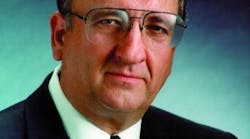When I got onto the airplane in Cedar Rapids to fly to Houston for the ISA Show, I sat next to a Maytag engineer who was on his way to Monterrey, Mexico. He was coordinating the purchase of structural steel being used to build Maytag's new appliance manufacturing plant in Mexico.
At the very first ISA technical session on Tuesday morning, a control engineer told me,"I got laid off at Baytown. They are shutting down my plant and building a new one in Kyrgyzstan. I can have a job there if I want to relocate." The process industries are getting out of Dodge, it seems, and building new plants all over the world, where legal, environmental, liability, and labor issues are easier to deal with. We get news releases every day from companies like Emerson, Honeywell, Foxboro, ABB, Siemens and the like, all bragging about the contracts they've gotten for new distributed process control systems. Based on the number of releases we get, plenty of new process control systems are being installed today. Problem is, they are all overseas. One vice president of a process control company told me, "The problem is that our current and traditional process markets in the U.S., Canada, and Western Europe continue to shrink at a dramatic pace, with plant closings, units deactivated, maintenance budgets non-existent and, obviously, a dearth of projects and new construction. The markets that are ticking along, such as bio-pharm, water & wastewater, power, oil & gas, etc., use a fraction of the instrumentation of a major chemical, refinery or petrochem facility. Also, plants don't consume products at near the rate as the good old scheduled plant turn-arounds that we and our distributors enjoyed for so many years."We heard that same lament recently from both Honeywell and Fisher Controls: process plants once shut their plants twice a year , in the summer and at Christmas , for maintenance and upgrades. Now, plants have planned shutdowns only once every two or three years. They limp along as best they can, while maintenance problems pile up and operational efficiency suffers. U.S. plants get a pittance for maintenance and upgrades, because it seems most of the available funds are going to build new plants elsewhere. One might suspect that domestic process plants are on the way to Shutdown City."We're like most companies, moving our sales and marketing focus toward the geographic regions where the action is, like the Far East, where plants are being constructed to be closer to the actual customer," my vice president source continues. "Process companies make feedstocks for the plastics and synthetics that are being consumed by local manufacturers that produce appliances and clothing. Being closer to the manufacturers and having a more friendly attitude toward environmental and safety regulations are driving the exodus."Lane Desborough, director of strategy at Honeywell, says Honeywell has shipped more than 500 Experion PKS control systems to date. "44% of those shipments have been to customers in the Americas, 32% to Europe/MiddleEast/Africa, and 24% to Asia-Pacific. The rough split between developed and developing economies is 73%/27%, respectively," he says. "One rationale for the disproportionately large number of press releases on project wins outside of North America is that these are big orders," he explains. "These customers are at the beginning of the lifecycle of their plants, making large investments to bring greenfield facilities on line." Therefore, although 44% of the systems are coming here, the projects are so small they don't warrant a press release. Obviously, a $50,000 upgrade in Houston is not nearly as newsworthy as a new $10 million installation in China.ABB says that, although they are based in Europe, the U.S. market is still significant. "The Americas account forabout 20% of revenues, vs. 54% Europe, 19% Asia, and 7% Middle East and Africa," says spokesperson Laura Patrick. Emerson Electric's 2003 annual report says international sales provide 45% of total revenue, and they intend to grow that to 60%. Emerson's sales in Asia reached $1.7 billion in 2003.When process plants and control systems go overseas, so do the jobs. So, if you want a job as a process control engineer, you may have to go where the plants go, and move to Kyrgyzstan or China or India. This may or may not be so bad: thousands of engineers and techs worked for ARAMCO and other U.S. and European-based companies to build the oil refining infrastructure in the 1960s and 1970s. You may want to put off getting that MBA in favor of taking a crash course in Chinese or Russian. You'll be much better prepared for your new job that way.




